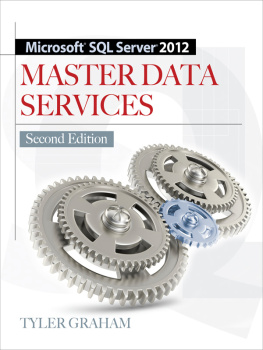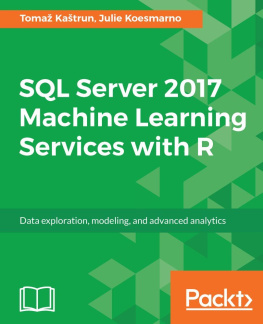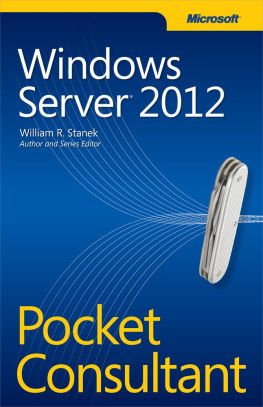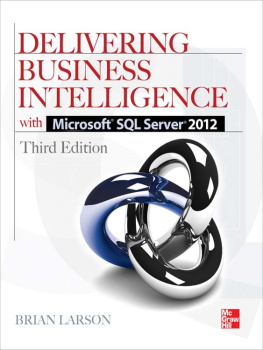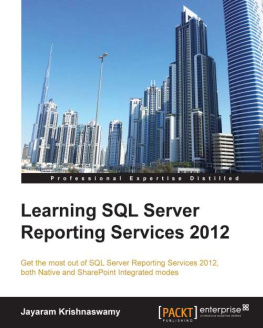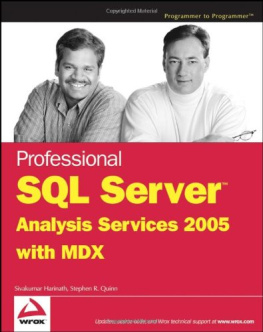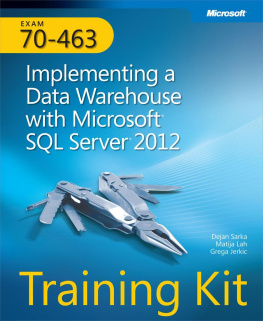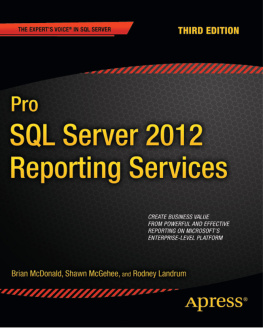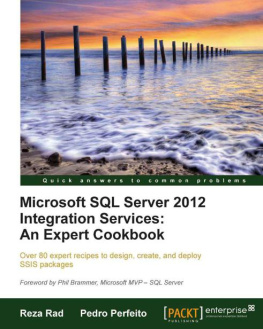Microsoft SQL Server 2012
MASTER DATA SERVICES
Second Edition
About the Author
Tyler Graham is Director of Industry Solutions for the Profisee Group. He moved to Profisee after completing the latest release of Master Data Services as a Senior Program Manager for Microsoft. He has spent over ten years in the data management space and is a frequent speaker at conferences. When he is not working on learning new industry, he is skiing, swimming, or hiking with his family.
About the Technical Editor
Lynn Gasch has worked in software development and testing for more than ten years. After completing degrees in computer science and mathematics at Virginia Tech, she hired on at a small Seattle office focused on artificial intelligence research, and tackled projects in diverse areas such as computer-based education, network monitoring and security, data mining, and information retrieval. She joined Microsoft four years ago and is currently a member of the SQL Server Master Data Services test team. When not working, Lynn and her family enjoy the recreational opportunities of the Pacific Northwest, and she will endeavor to stay off crutches next ski season. Lynns review of this book was based on her own personal opinions, and not in her capacity as a Microsoft employee.
Microsoft SQL Server 2012
MASTER DATA SERVICES
Second Edition
Tyler Graham
New York Chicago San Francisco Lisbon London Madrid Mexico City Milan New Delhi San Juan Seoul Singapore Sydney Toronto |  |
Copyright 2012 by The McGraw-Hill Companies. All rights reserved. Except as permitted under the United States Copyright Act of 1976, no part of this publication may be reproduced or distributed in any form or by any means, or stored in a database or retrieval system, without the prior written permission of the publisher.
ISBN: 978-0-07-179786-3
MHID: 0-07-179786-6
The material in this eBook also appears in the print version of this title: ISBN: 978-0-07-179785-6,
MHID: 0-07-179785-8.
McGraw-Hill eBooks are available at special quantity discounts to use as premiums and sales promotions, or for use in corporate training programs. To contact a representative please e-mail us at .
All trademarks are trademarks of their respective owners. Rather than put a trademark symbol after every occurrence of a trademarked name, we use names in an editorial fashion only, and to the benefit of the trademark owner, with no intention of infringement of the trademark. Where such designations appear in this book, they have been printed with initial caps.
Information has been obtained by McGraw-Hill from sources believed to be reliable. However, because of the possibility of human or mechanical error by our sources, McGraw-Hill, or others, McGraw-Hill does not guarantee the accuracy, adequacy, or completeness of any information and is not responsible for any errors or omissions or the results obtained from the use of such information.
TERMS OF USE
This is a copyrighted work and The McGraw-Hill Companies, Inc. (McGrawHill) and its licensors reserve all rights in and to the work. Use of this work is subject to these terms. Except as permitted under the Copyright Act of 1976 and the right to store and retrieve one copy of the work, you may not decompile, disassemble, reverse engineer, reproduce, modify, create derivative works based upon, transmit, distribute, disseminate, sell, publish or sublicense the work or any part of it without McGraw-Hills prior consent. You may use the work for your own noncommercial and personal use; any other use of the work is strictly prohibited. Your right to use the work may be terminated if you fail to comply with these terms.
THE WORK IS PROVIDED AS IS. McGRAW-HILL AND ITS LICENSORS MAKE NO GUARANTEES OR WARRANTIES AS TO THE ACCURACY, ADEQUACY OR COMPLETENESS OF OR RESULTS TO BE OBTAINED FROM USING THE WORK, INCLUDING ANY INFORMATION THAT CAN BE ACCESSED THROUGH THE WORK VIA HYPERLINK OR OTHERWISE, AND EXPRESSLY DISCLAIM ANY WARRANTY, EXPRESS OR IMPLIED, INCLUDING BUT NOT LIMITED TO IMPLIED WARRANTIES OF MERCHANTABILITY OR FITNESS FOR A PARTICULAR PURPOSE. McGraw-Hill and its licensors do not warrant or guarantee that the functions contained in the work will meet your requirements or that its operation will be uninterrupted or error free. Neither McGraw-Hill nor its licensors shall be liable to you or anyone else for any inaccuracy, error or omission, regardless of cause, in the work or for any damages resulting therefrom. McGraw-Hill has no responsibility for the content of any information accessed through the work. Under no circumstances shall McGraw-Hill and/or its licensors be liable for any indirect, incidental, special, punitive, consequential or similar damages that result from the use of or inability to use the work, even if any of them has been advised of the possibility of such damages. This limitation of liability shall apply to any claim or cause whatsoever whether such claim or cause arises in contract, tort or otherwise.
Dedicated to Tera, who made all of this possible.
Contents
Foreword
I n the last few weeks I have received duplicate mailings from my bank. My doctor confused my records with another patient, also D. Farmer. A carrier delivered a ceiling fan, ordered online, with a remote control that does not match it; and the next day delivered a pair of shoes of the right brand, the right color, the right size, but the wrong model.
I doubt that I am especially unlucky: we have all had similar experiences. The retailers, manufacturers, and service providers on the other side of these mishaps all have something in commonproblems with master data.
That these problems are so familiar is a sign that they are pervasive. And over the years we, in the world of data management, have tried to solve them in many ways. We created reference data sets, but often ended up with multiple reference sets covering the same field confusingly. We built data warehouses to drive reporting and analytics, and thought to use them as our single version of the truth. However, the data warehouse was populated and maintained on a different cycle, and for different purposes, than our line-of-business applications, and the data was not a suitable source for operational use.
In recent years, however, a body of practice has emerged that is aptly named master data management, or MDM. Practitioners dont stop at just compiling a reference data set, but implement architectures, data-driven processes, practices, and policies that oversee the entire lifecycle of data.
Tyler Graham has been at the forefront of this new practice. Tyler has seen the start of the master data management movement as a consultant solving complex issues for enterprise customers. He has also worked on software solutions, with the vendor Stratature, building an agile and effective MDM solution. More recently, Tyler has been at Microsoft building their Master Data Services platform, which brings master data capabilities to every user of the SQL Server database.

